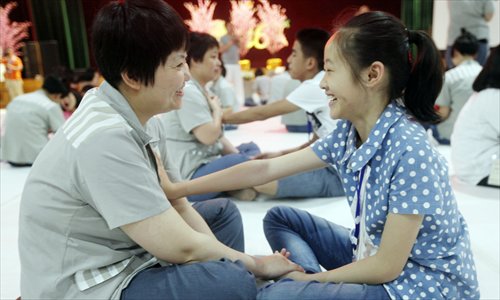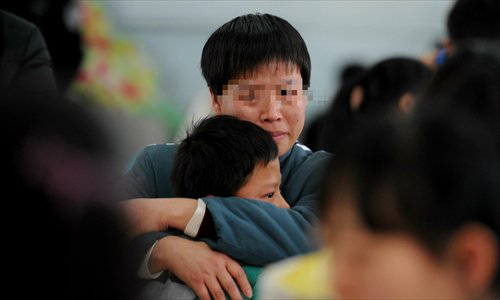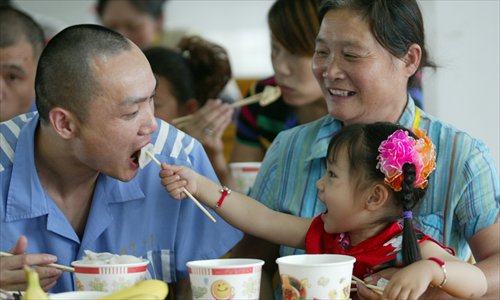Beijing NGO tries to help inmates’ children ignored by social security system
Nearly one million children in China have at least one parent in prison. Many of them are "de facto orphans" who lack any parental care or any support from the country's social security system. A Beijing NGO is trying to help these children heal and repair their relationships with their parents.

A teenage girl visits her mother on Mother's Day in Hunan Women's Prison in Changsha, Hunan Province on May 7, 2016. Photo: IC
It took a whole year for 10-year-old Min Ling and 17-year-old Min Xin (pseudonyms) to visit their father behind bars.
The sisters, from a city in Northwest China, are shy about expressing their emotions, shunning strangers and rarely speaking to others.
"Min Xin always looks standoffish. People who know her say it is not easy to get along with her. I guess it is because of her eyes, where she hides too many stories to read. You can feel the coldness even when she is smiling," Wang Xin (pseudonym), a social worker and childcare expert, told the Global Times.
In 2009, when Wang and some friends started an NGO to help migrant workers and their children living in cities, she heard the phrase "prison mission" for the first time from a foreign friend.
"I had no idea what he was talking about," Wang recalled. But six years later she found herself helping thousands of children like the Min sisters who have been virtually orphaned by the prison system.
"De facto orphans"
Three years ago in Nanjing, Jiangsu Province two girls were locked in their home while their mother, a drug addict, went to get her fix. Their father was in prison. The girls' emaciated bodies were found by police days later. They had starved to death.
There are many prisoners' children who receive little parental support and are "de facto orphans." A 2006 report from the Ministry of Justice (MOJ), the only national-level official report about prisoners' children, said there are at least 600,000 children with parents behind bars in China. Some experts have argued that this number is likely close to 1 million by now.
According to a 2011 survey conducted by the Family and Child Research Center at Beijing Normal University, the number of "de facto" orphans is around 580,000, almost equal to the country's official number of orphans.
The MOJ report said that at the time 94.8 percent of these children had never received any kind of support and many were suffering from physical and mental trauma.
The report added that 46 percent of their parents got divorced after one was sentenced to a jail term; 78 percent of these children live in households with a monthly income less than 900 yuan ($135); 82 percent of these children dropped out of school after their parents went to jail; and 2.5 percent of them become homeless.
A 28-year-old woman whose father is a convicted murderer, told the Global Times that when she was growing up she was often abused by her relatives who labeled her a "murderer's daughter."
"You can't imagine how many nights I cried myself to sleep and the damage it has done to my life, which persists to this day," she said.
A guard at a Shanghai prison who asked not be named told the Global Times that prisoners' children are ignored by the legal and civil system. The officer, who used to work at a juvenile reformatory, said such children are more likely to commit crimes than their peers.
"The vacuum left by of their parents makes it more likely they will befriend 'bad guys' who lead them down the wrong path," he said.
After the Nanjing incident, the Ministry of Civil Affairs tried to include prisoners' children in the social security system by treating them as orphans. But according to China's current laws and regulations, an "orphan" is strictly defined as a child whose parents are dead or missing. This means that prisoners' children cannot be sent to orphanages or adopted even though they may have no guardians to look after them.
Last year, in a groundbreaking case, a Jiangsu local court transferred a child's guardianship to the local civil affairs authority after her mother failed to do her parental duty while the girl's father was in jail.

12-year-old Taotao nestles in his mother's arms in a women's prison in Guizhou Province on Jan 18, 2016. Photo: CFP
Speaking for the voiceless
In 2011, Wang and some friends began approaching ex-prisoners and started their own organization based in Beijing aiming to help their children. Wang asked for her group not to be named as they want to keep a low profile.
"We want to speak for them, but first of all, we must understand their needs." Wang told the Global Times.
Their first task was to get a list of prisoners' children.
"Only relevant government organs have the list and they wouldn't give it to us because they don't trust us. When we approached them, they simply asked us 'who are you and why do you want this?'" Wang said.
Frustrated, Wang and her colleagues changed their approach in 2013 by holding a seminar which attracted many people who are involved in this field to discuss their experiences.
By doing so, people from different areas and government departments came to know them. Some of them then helped Wang gain access to the list of prisoners' children. Wang and her organization were later invited to work with a juvenile protection center across the country to help prisoners' children in need.
"In fact, non-governmental organizations play very important role in caring for those left behind children. They can find these children quickly and prevent them from getting hurt or falling into trouble." Zhang Liu, a researcher from the China Philanthropy Research Institute said.
In June, the State council published an official announcement which encouraged grass-root organizations to participate in various areas involving prisoners' children.
"This is good news for us since top government leaders highly valued the issue and lay down policy in favor of our work." Wang said.
Repairing relationships
Over the past six years of dealing with prisoners' children, Wang felt that prisoners' children's deepest desire is to restore their relationship with their parents. If someone could help them to realize this dream, it would have a huge impact.
"A kid's living environment has a significant impact on their entire life. A stable, healthy family relationship is the safest shelter for children to grow up in. But prisoners' children are innocent and silent victims." Wang Xin said.
The Ministry of Justice's report indicated that prisoners' children face issues ranging from poverty, a lack of education, homelessness, criminality, custody battles and an absence of emotional support. Compared to the economic, health and educational issues, Wang said the broken family relationship has been much less valued.
"We think rebuilding the children and their parents' relationship could not only strengthen the children's resilience, but also help prisoners have some hope when facing their future." Wang said they are now focusing on providing systematic guidance for people looking to get involved in helping prisoners' children.
Now Wang's organization is building a platform focusing on sorting different children according to their status and training social workers to visit them if needed.
"We are prompting children to visit their parents behind bars. This could be the first step toward fixing their broken relationship," Wang said. According to the NGO's statistics, only 8 percent of such children have done so.
"I believe prisoners can be good parents even though they are behind bars. Regular communication with their kids and face to face meetings can greatly help parents fulfill their duty and effectively prevent their kids from taking the wrong path."Wang said.
"Repairing the broken relationship, we believe, is a way for both children and parents to walk out of the shadow of the past," she added.

A male prisoner's daughter feeds him a dumpling during a family reunion event in a city prison in Wuchang, Hubei Province on Children's Day 2010. Photo: CFP
An hour with Dad
Two years ago, Wang met the Min sisters through a juvenile protection center. Their mother is mentally ill and abandoned the girls after their father was imprisoned.
The sisters have a younger brother. He lives with a disabled relative who can't afford to also look after the sisters. Without any other relatives willing or able to raise them, the local juvenile protection center has become their unofficial guardian.
Last year, Wang accompanied the two sisters on a visit to their father in the prison for the first time since they were separated. This year they took a second visit. Wang said that these children rarely visit their parents because they cannot afford to travel.
Wang and her colleagues persuaded the prison authorities to allow the meeting to take place in a counseling room. This meant that unlike in most prison visits, in which the visitors and prisoner are separated by glass, the family could talk face to face and even touch each other.
When the sisters sat down, the father brought out two bags filled with all kinds of snacks, which stunned everyone in the room. He explained he had saved up to buy them for months so he could give them to his daughters when they came to visit.
Min Xin and Min Ling had rare smiles on their faces when they received their present. Then they started telling their father all about their lives, before playing guessing games with each other.
"When Min Ling won, I felt she laughed so hard that her face must have hurt," Wang said.
The prison guard watching over the meeting told them that their father, who used to be edgy and pessimistic, was now a model prisoner and had seen his sentence reduced.
The father told the sisters he had been given a phone card this month, so he could call them more often. He encouraged Min Xin to study hard for her university entrance exams. "Don't worry about the tuition fees. I will take care of them."
Wang could see that the family had changed. "One year ago, the sisters didn't talk much with their father and he looked very sad but now they have so much to talk about and the father has a more kind and loving smile on his face. I can see there is hope in his heart." Wang said.
Newspaper headline: Orphaned by prison